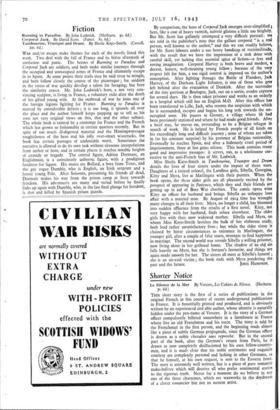Fiction
Tambourine, Trumpet and Drum. By Sheila Kaye-Smith. (Cassell. zos. 6d.)
WAR and/or escape make themes for each of the novels listed this week. Two deal with the fall of France and its bitter aftermath of confusion and panic. The heroes of Running to Paradise and Corporal Jack are soldiers, and both make similar journeys through the occupied and unoccupied zones of France and ultimately escape in to Spain. At some points their trails may be said even to mingle, and both follow closely the course of the picaresque ; for soldiers in the stress of war quickly develop a talent for foraging; but here the similarity ceases. Mr. John Lodwick's hero, a not very con- vincing sculptor, is living in France, a voluntary exile after the death of his gifted young wife. At the outbreak of war he joins one of the foreign legions fighting for France. Running to Paradise is marred by considerable defects; is too long, it sprawls all over the place and the author himsef keeps popping up to tell us his own not very original views on this, that and the other subject. The whole book is tainted by a contempt for France and the French which has grown so fashionable in certain quarters recently. But in spite of too much ill-digested material and the Hemingwayesque toughishness of the hero and his jolly over-smart wisecracks, the book ha.s certain passages of undeniable merit. Sometimes the narrative is allowed to do its own task without tiresome interpolations from author or hero, and in certain places it reaches notable heights of comedy or tragedy. The central figure, Adrian Dormant, an Englishman, is a consciously unheroic figure, with a prodigious fondness for liquor. His mates are Bollard, a bore from Texas, and the gay rogue Dumble, who is English, an Irish sergeant and a heroic young Pole. After Soissons, presuming his friends all dead, Dormant makes his way from the prison camp at Sens towards freedom. His adventures are many and varied before he finally links up again with Dumble, who, in the last final plunge for freedom, is shot and killed by Spanish prison guards.
By comparison, the hero of Corporal Jack emerges over-simplified ; here, like a coat of heavy varnish, naiveté glistens a little too brightly. But Mr. Scott has gallantly attempted a very difficult portrait; we are told in the publisher's note that the gallant corporal " is a real person, well known to the author," and this we can readily believe, for Mr. Scott labours under a too heavy handicap of verisimilitude, with the result that we have the impression of a task done with careful skill, yet lacking that essential spice of fiction—a free and roving imagination. Corporal Harvey is both brave and modest, a decent, honest, well-meaning young fellow ; because of the very respect felt for him, a too rigid control is imposed on the author's conception. After fighting through the Battle of Flanders, Jack Harvey, of the Durham Light Infantry, is one of those who gets left behind after the evacuation of Dunkirk. After the surrender of the tiny garrison at Boulogne, Jack, out on a sortie, evades capture for several days. He is then taken prisoner and works as an orderly in a hospital which still has an English M.O. After this officer has been transferred to Lille, Jack, who resents the suspicion with which he is surrounded, escapes and begins his long trek towards the un- occupied zone. He pauses at Grosny, a village where l had been previously stationed and where he had made good friends. After a brief stay, he moves on, pretending to be a Belgian refugee in search of work. He is helped by French people of all kinds on his exceedingly long and difficult journey ; none of whom are taken in (to his constant surprise) by his pretence of Belgian nationality. Eventually he reaches Spain, and after a hideously cruel period of imprisonment, there at last gains release. This book contains many good and impressive passages: it serves, too, as a wholesome cor- rective to the anti-French bias of Mr. Lodwick.
Miss Sheila Kaye-Smith in Tambourine, Trumpet and Drum details the lives of four sisters under the impact of three wars. Daughters of a retired colonel, the Landless girls, Sibylla, Georgina, Kitty and Myra, live at Marlingate with their parents. When the book opens, the three older girls are all pleasantly excited by the prospect of appearing in Patience, which they and their friends are getting up in aid of Boer War charities. The comic opera wins Kitty an officer for husband and brings Sibylla an unhappy love affair with a married man. By August of 5914 time has wrought many changes in all their lives. Myra, no longer a child, has bloomed into sudden affluence from the results of a first novel. Kitty, not very happy with her husband, finds solace elsewhere. The older girls live with their now widowed mother. Sibylla and Myra, on whom Miss Kaye-Smith lavishes the bulk of her elaborate study, both lead rather unsatisfactory. lives ; but while the elder sister is chained by bitter circumstances to existence in Marlingate, the younger girl, after a couple of false starts, manages to find happiness in marriage. The second world war reveals Sibylla a willing prisoner, now living alone in her girlhood home. The shadow. of an old sin falls heavily on Myra, but she is fortune's favourite, and things are again made smooth for her. The sisters all meet at Sibylla's funeral ; she is an air-raid victim ; the book ends with Myra pondering the


























 Previous page
Previous page